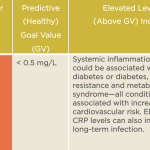The mysterious world of CRP levels: Unraveling the secrets of High Sensitivity C Reactive Protein
A Closer Look at the Complexities of Inflammation
In a seemingly straightforward test result, your doctor might casually mention a “high sensitivity c reactive protein” level without giving you much context. But what does it really mean? Is it just another medical jargon to worry about or is there more to the story?
A Brief Primer on CRP
CRP (C-Reactive Protein) is a biomarker that measures the level of inflammation in your body. When you’re injured, your body responds by sending out signals to repair and heal itself – and that’s when CRP levels typically rise. However, chronic inflammation, which can be triggered by various factors like lifestyle choices or underlying conditions, is where things get complicated.
Now, let’s dive deeper into the world of High Sensitivity C Reactive Protein (hs-CRP). In this blog post, we’ll explore what high hs-CRP levels mean and how they can impact your overall health. We’ll also cover some key points to consider when interpreting your test results and what you can do to take control of your inflammation levels.
The mysterious world of CRP levels: Unraveling the secrets of High Sensitivity C Reactive Protein (continued)
What Does High Sensitivity CRP Really Mean?
As we discussed earlier, CRP is a biomarker that measures inflammation in your body. When hs-CRP levels are high, it can indicate chronic inflammation, which can be linked to various health issues, such as cardiovascular disease, diabetes, and even some cancers. But why do these levels rise? There are several reasons:
Chronic diseases: Conditions like diabetes, arthritis, or autoimmune disorders can trigger high hs-CRP levels.
Lifestyle factors: Poor diet, lack of exercise, smoking, and excessive drinking can contribute to inflammation.
Infections: Bacterial, viral, or fungal infections can cause high CRP levels as your body responds to the invader.
Stress: Chronic stress can lead to increased hs-CRP levels, making it essential to manage your stress levels effectively.
It’s essential to note that a single high hs-CRP level doesn’t necessarily mean you have an underlying condition. However, if you consistently show elevated levels, it may be worth exploring potential causes with your healthcare provider.
The Impact of High Sensitivity CRP on Your Health
High hs-CRP levels can increase your risk of developing or exacerbating various health issues, including:
CARDIOVASCULAR DISEASE: Elevated CRP levels have been linked to an increased risk of heart attacks, strokes, and other cardiovascular events.
DIABETES: High hs-CRP levels can predict the development of type 2 diabetes and worsen existing condition symptoms.
CANCER: Some studies suggest that high CRP levels may be linked to an increased risk of certain types of cancer, such as breast or colon cancer.
As you can see, understanding your hs-CRP levels is crucial for maintaining optimal health. In our next section, we’ll explore ways to reduce inflammation and take control of your CRP levels.
Get Expert Advice on High Sensitivity C Reactive Protein
Consult with medical experts to better understand the implications of high sensitivity C-reactive protein levels.
Consult a Medical ExpertThe mysterious world of CRP levels: Unraveling the secrets of High Sensitivity C Reactive Protein
A Closer Look at the Complexities of Inflammation
In a seemingly straightforward test result, your doctor might casually mention a “high sensitivity c reactive protein” level without giving you much context. But what does it really mean? Is it just another medical jargon to worry about or is there more to the story?
A Brief Primer on CRP
CRP (C-Reactive Protein) is a biomarker that measures the level of inflammation in your body. When you’re injured, your body responds by sending out signals to repair and heal itself – and that’s when CRP levels typically rise. However, chronic inflammation, which can be triggered by various factors like lifestyle choices or underlying conditions, is where things get complicated.
Now, let’s dive deeper into the world of High Sensitivity C Reactive Protein (hs-CRP). In this blog post, we’ll explore what high hs-CRP levels mean and how they can impact your overall health. We’ll also cover some key points to consider when interpreting your test results and what you can do to take control of your inflammation levels.
Key Points Covered So Far
We’ve explored the basics of CRP and its role in measuring inflammation. High sensitivity c reactive protein (hs-CRP) is a specific type of CRP that’s more sensitive to changes in your body. Now, let’s summarize what we’ve covered:
- CRP measures the level of inflammation in your body
- High sensitivity c reactive protein (hs-CRP) is a specific type of CRP that’s more sensitive to changes in your body
- Chronic inflammation can be triggered by various factors like lifestyle choices or underlying conditions
Final Insights
Sometimes, it’s not just about the number on the test result. High sensitivity c reactive protein levels are often a sign of an underlying issue that needs attention. By understanding what your hs-CRP level means and taking steps to address any inflammation, you can take control of your health.
Conclusion
In conclusion, high sensitivity c reactive protein (hs-CRP) is more than just a number on a test result. It’s a signal that something’s amiss in your body, and it’s up to you to listen and take action. By understanding what your hs-CRP level means and taking steps to address any inflammation, you can reduce your risk of chronic diseases and improve your overall well-being.



